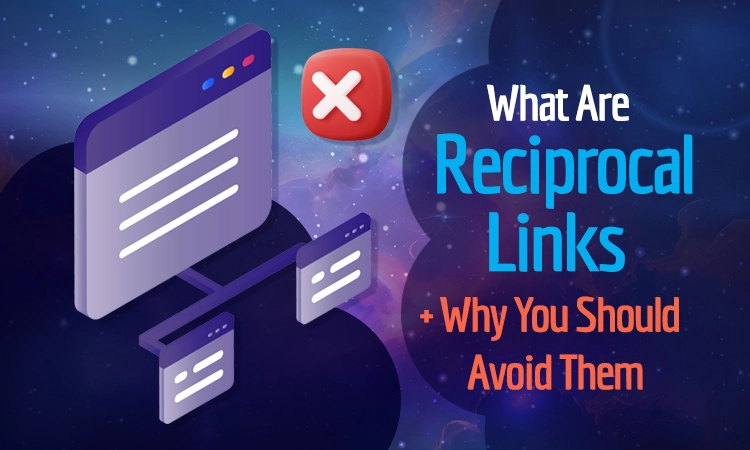Are Reciprocal Links A Natural Phenomenon or an SEO Risk?
Executive Summary
Reciprocal links are not inherently harmful; in fact, industry data shows they appear in the backlink profiles of 74% of high-traffic websites as a natural result of citation and shared topical relevance. The real risk is not their existence, but their concentration.
When reciprocal links form predictable patterns, search engines stop treating them as independent validation and quietly discount their value. Below, we explain how to audit reciprocal link overlap, measure your reciprocity ratio, and identify when natural link relationships shift from neutral to limiting your SEO growth.
How to Audit and Diagnose Link Overlap
If you analyze the backlink profile of almost any established website, you will find reciprocal links. That is not a warning sign by itself. In most cases, reciprocal links are a natural byproduct of authority, relevant sites cite each other, audiences overlap, and links form organically over time.
Large-scale industry studies analyzing more than 140,000 domains with consistent organic traffic show that roughly three out of four high-traffic websites have reciprocal links in their backlink profiles. In other words, reciprocal links are the norm, not the exception.
The risk is when those links form detectable patterns that search engines interpret as manufactured rather than editorial.
This guide focuses on the diagnostic side of SEO. While our separate guide on strategic link partnerships covers how to build link relationships intentionally, this article explains how to audit reciprocal links, measure link overlap, and identify when natural relationships quietly stop contributing to improved search engine rankings.
What Are Reciprocal Links?
Reciprocal links form when two websites link to each other. This often happens naturally when sites publish complementary content, reference similar resources, or operate within the same industry.
Problems arise when reciprocal links are created primarily to manipulate rankings rather than to provide value to users. At scale, this behavior can resemble a link scheme and violate search engine guidelines, even if no single link appears suspicious on its own.
Understanding the difference between natural reciprocity and manufactured exchange is critical to protecting your site’s backlink profile and long-term SEO performance.
The Natural Occurrence of Reciprocal Links
Most site owners are surprised when they first notice reciprocal links in tools like Ahrefs, Semrush, or Google Search Console. That concern is usually misplaced.
Industry research consistently shows that:
- The majority of authoritative websites have some level of reciprocal linking
- Even top-ranking pages commonly link to sites that also link back
- Complete absence of reciprocal links is rare outside of very small or inactive sites
Reciprocal links exist because the web is interconnected. When websites publish high-quality content, cite relevant sources, and become recognized within a niche, link overlap develops naturally.
The distinction search engines care about is pattern density, not existence.
The Reciprocity Ratio
Rather than asking whether reciprocal links are “good” or “bad,” a more helpful question is:
How much of your backlink profile depends on mutual linking relationships?
This is where the reciprocity ratio becomes useful.
The reciprocity ratio measures the percentage of referring domains that also appear as outbound linking domains. In simple terms, it shows how much overlap exists between the sites linking to you and the sites you link to.
Interpreting Reciprocity Ratios
While Google does not publish a specific threshold, large-scale backlink analysis reveals consistent patterns across industries.
Reciprocal Link Ratio Zones
- Green Zone (0–20%)
A natural link ecosystem. Common among authoritative sites that cite relevant resources and are cited back organically. - Yellow Zone (20–40%)
Elevated overlap. Often indicates repeated partnerships or early-stage link trading. Rankings may hold, but growth frequently slows. - Red Zone (40%+)
High-risk territory. Strongly suggests systematic link exchanges. In most cases, search engines discount link equity rather than applying direct penalties.

This ratio helps diagnose whether your link profile supports independent authority or relies too heavily on closed loops.
How to Audit Reciprocal Links
Auditing reciprocal links is about identifying patterns, not haphazardly cutting anything that looks suspicious.
Using SEO Tools to Measure Overlap
In tools like Ahrefs or Semrush, you can audit reciprocal links by:
- Exporting your referring domains
- Exporting your outbound linked domains
- Measuring overlap between the two lists
- Segmenting overlap by:
- page type
- topical relevance
- anchor text
- link placement
- site quality
A handful of reciprocal links spread across strong editorial content is usual. Concentrated overlap tied to the same link partners, page templates, or anchor patterns is where risk accumulates.
How Reciprocal Links Affect SEO Today
Reciprocal link building is often misunderstood because the consequences are subtle.
Penalties Are Rare. Nullification Is Common.
Contrary to popular belief, Google rarely penalizes small-scale reciprocal linking with manual actions. Instead, it devalues links that appear transactional or overly coordinated.
This explains why many sites “get away with” reciprocal links for years. They are not punished. They are capped.
When the link value is nullified:
- Rankings stagnate
- Authority fails to compound
- Additional link building produces diminishing returns
From the outside, it looks like SEO “stopped working.” In reality, trust stopped increasing.
Red Flags That Turn Reciprocal Links Into Risk
Use the following checklist when auditing link overlap.
High-Risk Patterns
- Sitewide reciprocal links in footers or sidebars
- Repeated swaps across multiple pages with the same link partner
- Clusters of websites are all exchanging links with each other
- Reciprocal links from unrelated or low-quality sites
- Pages created primarily to host outbound links
- Symmetrical or overly optimized anchor text on both sides
Individually, these signals may not matter. Together, they form a link scheme footprint that search engines can discount algorithmically.
Reciprocal Links vs. 3-Way Exchanges
This distinction matters for diagnosis, not execution.
- Reciprocal link:
Site A ↔ Site B
A closed loop that is easy to detect and often devalued. - 3-way exchange:
Site A → Site B → Site C → Site A
An open loop that breaks direct reciprocity and more closely resembles natural citation flow when rooted in a real editorial context.
This guide focuses on identifying when your existing backlink profile relies too heavily on closed loops. Strategic link partnerships and 3-way value exchange are covered separately.
What to Do If Your Reciprocity Ratio Is Too High
If your audit reveals elevated overlap, the goal is not to panic or mass removal. The goal is restoring independence.
Step 1: Stop Creating New Reciprocal Loops
Avoid return-link expectations, especially on the same page types.
Step 2: Remove the Weakest Links First
Prioritize removing:
- Irrelevant reciprocal links
- sitewide placements
- pages built primarily for linking
Step 3: Rebalance With One-Way Validation
Earning independent, editorial links reduces the percentage impact of reciprocal links and restores authority growth.
Step 4: Re-Audit Quarterly
Reciprocal overlap tends to creep upward over time. Treat audits as routine SEO hygiene.
Monitoring and Maintaining Reciprocal Links
Links and websites change. A healthy backlink profile requires ongoing review.
- Regularly check link partners for relevance and content quality
- Remove links that no longer align with your site’s focus
- Update outbound links when your content strategy changes
The goal is a backlink profile that consistently reinforces topical authority without relying on mutual obligation.
Conclusion
Reciprocal links are common, natural, and unavoidable in mature link ecosystems. Large-scale studies show that the majority of high-traffic websites have them. The risk is the pattern density that causes search engines to discount link equity.
If you want help auditing your reciprocity ratio, identifying link overlap patterns, or rebuilding a natural link profile that compounds over time, Stellar SEO’s expert link building team can help you evaluate your current status and prioritize what to fix first.
Reciprocal Link Building FAQs
Are Reciprocal Links Good for Search Engine Optimization?
Reciprocal links are good when they happen just as natural citations between relevant websites. When reputable websites link to you because you have high-quality content, it signals trust. However, excessive reciprocal linking done purely for SEO purposes can hurt your site’s credibility. The key is moderation; too many reciprocal links can look like a scheme rather than organic growth.
How Do I Build Reciprocal Links Safely?
You should not actively try to build reciprocal links. Instead, focus on link-building strategies that earn one-way links, such as digital PR or guest posting. If you do engage in link exchanges, ensure they are with link partners who have absolute site authority. Avoid swapping links with unrelated websites via mutual agreement, as Google’s guidelines flag such links as manipulative.
Do Reciprocal Links Improve Search Engine Rankings?
They can contribute to improved search engine rankings if they drive referral traffic and come from contextually relevant pages. However, valuable backlinks from one-way links (where one site links to you without a return link) generally pass more authority. If you use reciprocal links as your primary SEO strategy, you may find your search rankings cap out because search engines discount the value.
What Is the Difference Between One-Way Links and Reciprocal Links?
One-way links occur when Website A links to Website B, but Website B does not link back. This is the gold standard for a website’s backlink profile. Reciprocal links refer to when websites agree to link to each other (A ↔ B). While reciprocal links are essential for a natural profile, search engines understand that one-way endorsements are more complex to fake.
Should I Avoid Linking to Other Sites?
No. You should not avoid linking to other websites if they provide value. Linking to relevant content helps search engines understand your topic. However, you should avoid linking to unrelated sites or bad neighborhoods to get a link back. Always ensure the external sites you reference are safe and high-quality.
Sources
- Ahrefs, Reciprocal Links Study: How Common Are They and Do They Matter for SEO?
- URL: https://ahrefs.com/blog/reciprocal-links/
- Note: This single article serves as the primary source for both the “140,000 domains” statistic and the “natural occurrence” argument.
Google Search Central, Spam Policies (formerly Link Schemes)
- URL: https://developers.google.com/search/docs/essentials/spam-policies#link-spam
- Note: Google renamed “Link Schemes” to “Link Spam” under their Spam Policies documentation.
Google Search Central, How Google Search Works
Semrush Blog, Backlink Audit Guide
- URL: https://www.semrush.com/blog/toxic-links-guidelines/
- Alternative: https://www.semrush.com/kb/580-auditing-your-backlinks
- Note: The exact title “How to Analyze and Clean Your Link Profile” is likely an older or paraphrased version of the headline. The “Toxic Links Guidelines” post is the most current and relevant resource for this topic on their blog.
Moz, The Beginner’s Guide to Link Building
Bill Slawski, SEO by the Sea (Link Signals)
- URL: https://www.seobythesea.com/2014/03/incomplete-google-ranking-signals-1/
- Note: While Bill (RIP) wrote hundreds of posts, this one explicitly covers “Local Inter-Connectivity” and “Hubs and Authorities,” the patent-based foundations for why Google nullifies/values specific link patterns.













